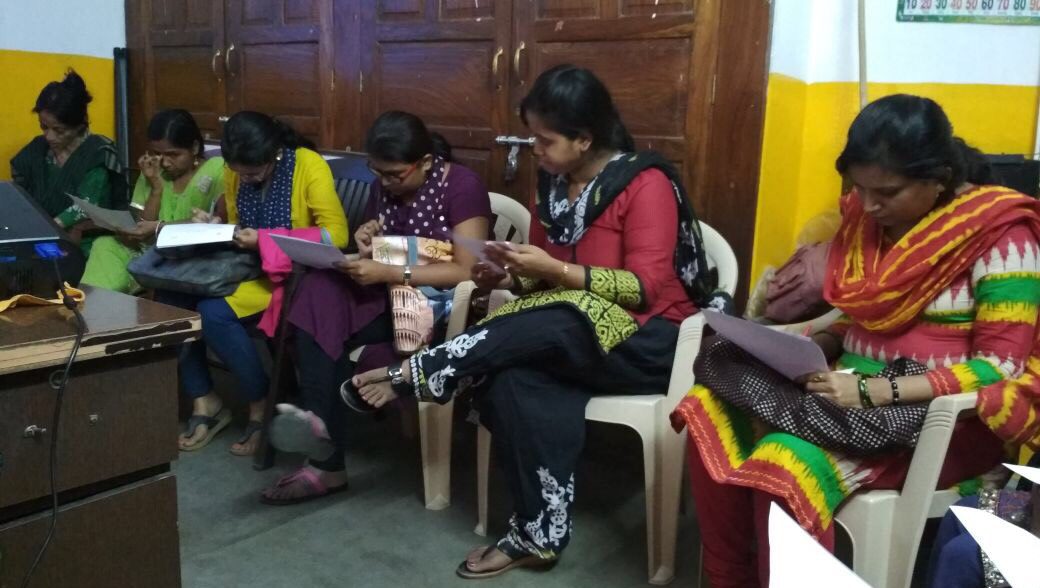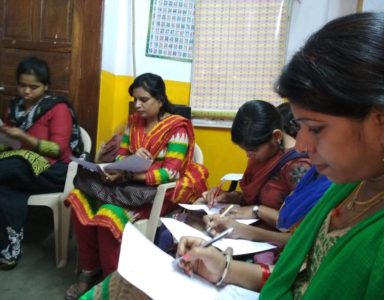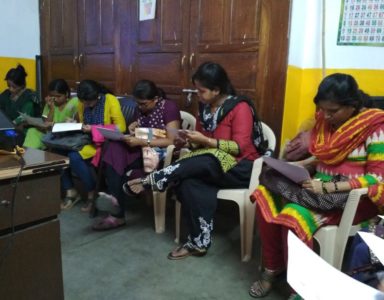Awareness Workshop about POCSO

Naina Jha is the Program and Outreach Officer at Patna. She is a PR professional working with Greymatters Communications. She has worked with hospitals, advertising and PR agencies and has been working with ICWA to educate slum kids since 2005. She has also worked as a freelancer with Gender Resource Centre, Patna. She loves working for the uplifting of slum children and gender sensitisation and wishes to make this society a better place to live in. She is a budding writer, avid learner, traveller, and a happy soul. A sociology graduate who holds a masters degree in human resources, she has a few more degrees up her sleeves but most importantly she is a mother to a beatific little angel.
Awareness Workshop about POCSO
Naina Jha conducted a workshop creating awareness about Child Sexual Abuse for 20 teachers at the St. John English School in Patna on 10th November, 2017. She writes,
“The workshop was specifically organised for the teachers of the school with the aim to spread awareness about child sexual abuse and the Prevention of Children from Sexual Offences (POCSO) Act.
Before you understand child abuse, the most basic but important question is who classifies as a child. When I asked this question to the audience, almost everyone said that they understood every person under the age of 14 to be a child and expressed surprise when I corrected them that the upper age limit was actually 18 and not 14. It is crucial information like this that can help you acknowledge child sexual abuse and help the child get the appropriate assistance.
We then moved on to throw some light on the difference between gender and sex and followed that with an elaborate discussion on some myths and facts on the POCSO Act.
Another key fact is that people are often unclear about is the correct definition of sexual abuse. There are various words and actions that should concern us but are often overlooked as sexual harassment is so common in the country. We have normalised and ignored a lot of things that count as sexual harassment, which is why it was crucial to make sure that people, especially with children, know when to raise an alarm. When I asked them what they thought considered child sexual abuse, a few of the teachers in the audience said that only when a child was sexually harassed or molested could they call it child sexual abuse. I explained to them that a child could be sexually abused by both touching and non-touching ways. Even touching them with the intention of sexual pleasure was sexual abuse. Showing child pornography, getting undressed and naked in front of them, all comes under child sexual abuse.
In addition to knowing what child abuse is and when it happens, it is equally important to recognise a potential sexual abuser and take necessary precaution when you can. I asked them what they thought could be the warning signs in a sexual abuser. At times, the abuser resorted to scaring and threatening their victim into not confiding with an adult. When this happens, the child is scared to seek help and often keeps getting abused assuming that there is no way out. The experience starts to affect them physically and psychologically. I discussed the behavioral changes that can help one identify a victim and provide the child with the appropriate care and help. I explained to them how as parents and teachers, the two kinds of people the child has most contact and connection with, they play a vital role in identifying an abused child and guiding him or her towards recovery. It takes a lot of courage, even more for a child, to admit that they’ve been a victim of sexual abuse. I told them how it was extremely important that they dealt with the news calmly and not scare or scold the child. It is crucial to understand how scary and confusing such an experience could be for a child and therefore the matter needed to be handled with utmost sensitivity and delicacy. I explained to them how a child subjected to sexual abuse needs support instead of disregard and how they, as teachers and parents, could be their rock.
As we concluded the workshop, we held a short discussion on some important points of the POCSO Act.
I would like to thank all the teachers who attended for the encouraging comments and reviews.”




